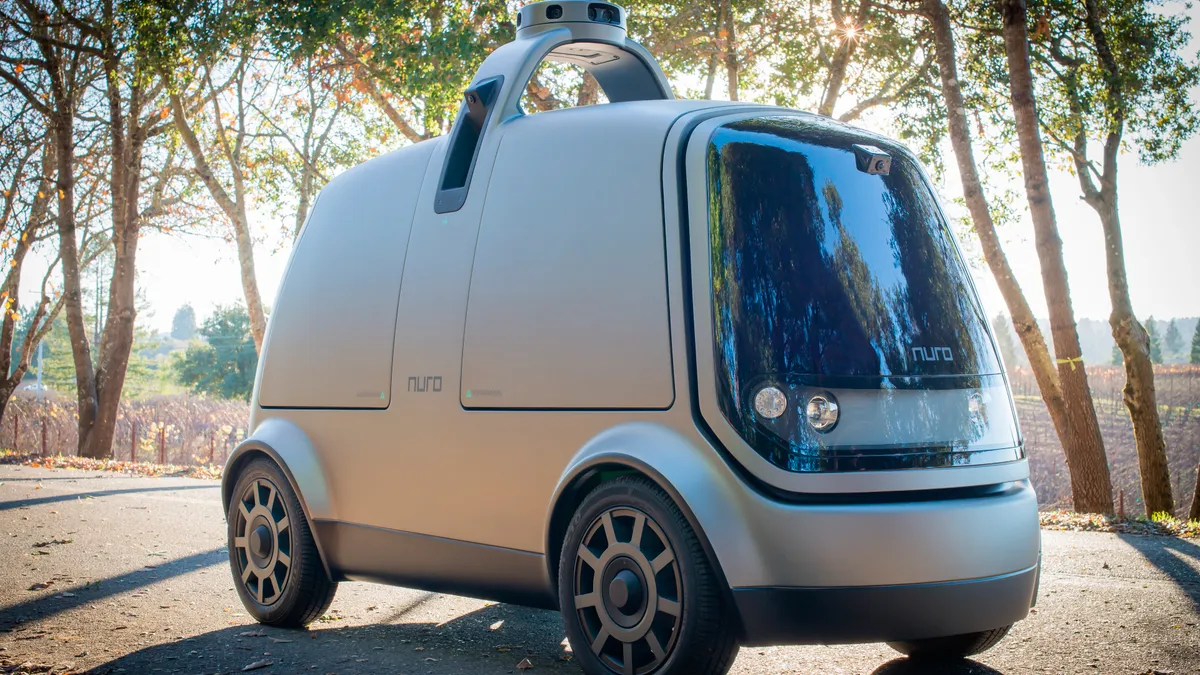Dive Brief:
- Autonomous delivery company Nuro has secured $500 million in a Series C funding round, it announced Monday. Funds and accounts advised by T. Rowe Price led the round, while Fidelity Management & Research, Baillie Gifford, SoftBank Vision Fund and Greylock also invested. The company is now valued at $5 billion, according to PitchBook.
- Earlier this year, the company’s R2 vehicle received the first, and so far only, federal approval for a driverless delivery vehicle. It is also the first robot delivery firm to operate fully autonomous vehicles in three states — California, Arizona and Texas.
- The pandemic has boosted its corporate partnerships and helped Nuro cut through regulatory red tape as online consumer demand swells. The company plans to roll out R2 commercially in the coming months and is working on developing R3, its third-generation vehicle that will become its mainstream, fully scalable vehicle.
Dive Insight:
Autonomous delivery promises to improve last-mile economics, but for now, the technology remains expensive and difficult to scale. But Nuro’s latest funding round, which builds on the nearly $1 billion it received last year, amounts to a vote of confidence in a concept that, while still a long way from mainstream deployment, still shows considerable promise.
The tech company, which is headquartered in Mountain View, California, and was started by two former Google engineers, originally aimed to roll out its fully autonomous R2 vehicle back in the spring, but pulled back as grocers fought to keep their shelves stocked at the beginning of the pandemic. In a recent interview, David Estrada, chief legal and policy officer of Nuro, said the company plans to roll out R2 in Houston in the coming months with one of its partner companies in the city — currently Kroger, Walmart, CVS and Domino’s.
Nuro is currently making deliveries for Kroger in six Houston ZIP codes, building on a pilot program that began in Arizona in 2018. Estrada said demand from the grocer's customers has shot up over the past several months and the “stickiness” of the service has improved. Kroger will begin making deliveries with the R2 vehicles in Houston at some point in the near future, he said.
Currently, Kroger customers are getting orders via Toyota Prius vehicles outfitted with R2 technology. Once the order arrives at shoppers' homes, they receive a text message prompting them to come out and gather their order from the vehicle — a process that simulates the R2 experience, said Estrada.
Walmart announced a partnership with Nuro last December, at the time noting that it would soon make deliveries in Houston using the R2 vehicles, but has not done so as of yet. The retailer has also partnered with autonomous vehicle companies Waymo and Udelv as well as Gatik, which handles middle-mile logistics
Nuro is working with regulators on being able to increase its maximum speed, which currently tops out at 25 miles per hour, Estrada said. This would expedite delivery times and give the vehicles access to more roads. Nuro also sees an opportunity to address food deserts by cost-effectively reaching neighborhoods where grocers don’t operate stores. The company has been making deliveries for the Houston Food Bank.
Besides Nuro, autonomous vehicle provider Starship Technologies recently began piloting deliveries from a Save Mart store in Modesto, California, while Deuce Drone will soon start making aerial deliveries for Rouses stores in Mobile, Alabama.













